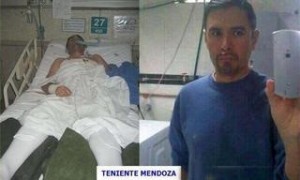
Source: Proceso (original version in Spanish)
Author: Arturo Rodríguez García
December 16, 2014
Translation: RZ for CART/ACDV
*N.B.: In accordance with our mission’s fifth objective, we reserve the right to disseminate information on cases of alleged injustice that we’re aware of but don’t handle directly. We contribute to and recognize the work of other organizations and other news media that defend and promote fundamental democratic rights.
He was shot by a superior with whom he had had personal issues in the past. He survived but could not put an end to the harassment. He is now locked up in jail having been accused of insubordination and assault. In fact, the truth of the matter is entirely different: military officers disguised themselves as federal police in an attempt to seize the former public utility company known as Luz y Fuerza del Centro (LFC) against president Calderon’s decree to liquidate it. It was Lieutenant Mendoza who lodged a complaint against these officers which has appeared in the pages of this weekly paper. In addition, he and some of his comrades had been supporting the extensive fight against the military justice system—which has been a source of numerous human rights violations—and had participated in the Movement for Peace, Justice and Dignity (MPJD) headed by poet Javier Sicilia.
On September 19, 2012, Lieutenant Marcos Gerardo Mendoza Perez went to the Las Americas Educational Institute in Naucalpan in the afternoon to see his son. It was there in front of his son, his son’s friends, teachers and other parents where he was shot.
For months he complained that his ex-wife’s partner, military justice colonel, Jose Raul Celedon Lamas, stopped him from seeing his son. The argument was that Mendoza had to obey orders and respect the chain of command.
It was on September 19 around 2:30 p.m. during the chaotic rush hour when hundreds of parents gather to pick up their kids at school that Mendoza arrived and saw Celedon. Without much skill, the colonel fired at least five shots. Two of the shots hit the lieutenant: one in the left rib and the other in his shoulder.
Amidst the horrified crowd, people were shouting out and pointing to Celedon, “It was the bald guy, it was the bald guy!”
According to witnesses, Vivian Prieto and Juan Manuel Samperio (their car was hit by the bullets), the lieutenant begged for mercy but the colonel continued to fire shots. The injured Mendoza crawled towards the El Huizachal gymnasium where a couple of soldiers got him into a van and took him to the military hospital. He had a perforated right lung.
Celedon fled with the lieutenant’s son and six hours later appeared before the military justice office and provided a different account of what happened: he said that he was gravely assaulted and fired the shots in self-defense. At that time, at the scene of the shooting, not even the spent bullet casings were left. He also accused the lieutenant of insubordination.
Mendoza was admitted to the Military General Hospital where he stayed for several weeks
When he was about to be discharged, officers of the Federal Judicial Military Police entered the hospital, arrested him and took him to the Military Base Number One prison where he remains locked up today.
The military justice system dismissed the firearm injuries and the civil justice system did not want to handle the charges of attempted manslaughter laid against the colonel, who is free and continues to work at the military justice office in Mazatlan. Meanwhile, for the alleged assault, the lieutenant is locked up in jail having been accused of insubordination and causing injuries to a superior.
When the incident occurred, neither of the two were dressed in uniform—they did not belong to the same unit and there was no command and subordination relationship—they were both off military duty, in a zone of civilians and off military grounds.
Nevertheless, military judges and a constitutional court denied Mendoza Perez’s request to have his case heard in a civil court. For years, he had been advocating for the elimination of the military court because he considered it an unjust system that violated human rights.
Marching for peace
A year before the shooting, Lieutenant Mendoza joined the MPJD which was founded by poet Javier Sicilia and family members of victims of violence during Felipe Calderon’s administration.
Outraged, several army and naval officers reported abuse in the military justice system, accusing it of human rights violations against military and non-military personnel alike.
Mendoza and some of his comrades used to be seen marching together with supporters of the said movement. They used to send letters to the National Human Rights Commission (CNDH) and to the representatives of the three branches of government and participated in forums and hearings of the House of Representatives to request reform of the military justice system.
For example, on June 26, 2012, the MPJD led a pilgrimage to the Basilica of Guadalupe where bishop Saltillo Raul Vera Lopez held a mass. The lieutenant and his comrades entered the basilica in a procession, arm in arm with family members of victims of violence committed against them by military personnel.
After that, the lieutenant made a public statement like a battle commander: he reported that on October 19, 2009, thousands of military officers were disguised as federal police in order to seize the offices of the LFC. President Calderon issued a decree that same evening to liquidate the LFC.
The statement was made known to Proceso in Edition #1841 on February 12, 2012. In the interview, Mendoza explained that they accused him of abandoning his duties. On different occasions, he questioned the operation to seize the LFC. He made sure that his soldiers were operating in subhuman conditions with orders to stop the workers from entering the building and keeping their military status a secret.
“The truth of the matter is that the only thing the workers did was hang up their banners. I never saw any acts of violence or abuse in an attempt to order us around, since although we were disarmed, we were soldiers. The workers demanded that they be left alone to do what they had to do. They never assaulted us,” he said.
He also spoke of his first disagreement with Colonel Celedon which was in May 2010 when he went to see his son at the military housing unit in Irapuato and was stopped by military police. He maintained that the order came from the colonel who threatened him and accused him of insubordination if he would try to see his son again. In any case, he remains accused of the crime.
“I told him that my rights were being violated because above all, this was a family matter and I had the right to visit and spend time with my son. But, that’s how it is in the army. They have a say even in your family business,” he explained.
Case facts and statements aside, the army and naval officers that participated in the MPJD including Mendoza, had a number of duties to fulfill: reveal the retained earnings of the military judges, investigate the chain of command in allegations of murder or violence committed against civilians, eliminate the military justice system and create a special tribunal (similar to the electoral tribunal) made up of civilian judges.
Appeal is rejected
After completing his convalescence at the Military General Hospital, the lieutenant remained a prisoner. Criminal case #462/2012 was opened and on November 26, 2012, he was sentenced to prison by the First Military Judge under Region 1 which was confirmed on April 8, 2013 by the Military Superior Court Justice.
The charges laid against the lieutenant for “attempted murder” of Celedon were filed by the Office of the Attorney General of the State of Mexico. The colonel is free, facing a simple charge of abuse of authority in the military justice system. In other words, he was not charged with shooting. According to the records of amparo trial #463/2013-IX-B of the First District Amparo Court in Criminal Matters, the lieutenant denied the criminal charges that were laid against him.
After Colonel Celedon prohibited Mendoza from visiting his son at his residence, he used to visit him after school. In accordance with the facts of the case as stated in the request for amparo, there was no order stopping Mendoza from visiting his son which was corroborated in the statement made by his ex-wife, Captain Maribel Vazquez Velez.
In the amparo trial, Mendoza demonstrated that on the day of the incident, neither of them was on military duty and that everything occurred off military grounds. He said that there was no case of insubordination since despite the colonel’s rank, they did not belong to the same unit and he was not under the colonel’s command.
He stressed that Celedon who was off military duty and not participating in any military operation whatsoever, used a gun in a zone of civilians and shot five times, which according to the colonel was done in self-defense.
The witnesses corroborated that the colonel was the aggressor yet Mendoza was accused of attempted manslaughter before the Prosecuting Agency of the Public Ministry, Bureau II of the civil court which to date has not been recorded in the file.
In the amparo trial, Mendoza argued that the case should have been handled in a civil court. The isolated ruling #313 404, Volume XXXVIII of 1933 was put forward where it was established that if a military officer who is off duty kills someone, the crime is handled in civil court. To that was added isolated ruling #11 which in recent years requires that the proceedings take place in a civil court.
During the trial, Celedon contradicted himself. For example, in the first statement he made, he maintained that he was assaulted and in self-defense took out his gun and fired shots but there was a jam so he continued to pull the trigger until he saw the lieutenant injured and that’s when he realized it was the boy’s father. In the second statement, he maintained that he saw the lieutenant coming towards him to attack him and therefore in self-defense had to fire the shots.
Nevertheless, the witnesses stated that the colonel led the assault against the lieutenant. Some said with hard blows and others said that both were fighting when the colonel took out his gun and fired shots.
For the military court, the crime of insubordination took place on September 19 because both were military officers— whether on or off duty—and Mendoza knew Celedon’s military rank and caused injuries with alleged blows. The military justice court accepted the charges of insubordination causing injuries to a superior even though during the trial, there was no evidence to prove that the lieutenant caused the injuries.
Mendoza tried to demonstrate with his arguments that Articles 14 and 16 of the Constitution were violated as well as provisions of international treaties signed by Mexico. Nevertheless, the appeal for amparo was denied and he was sentenced to prison for the same reason: the lieutenant knew Celedon’s military rank.
He remains locked up
Marcos Gerardo Mendoza was charged by General Rogelio Rodriguez Correa, who according to the lieutenant was Celedon’s colleague.
Rodriguez Correa had already charged Lieutenant Mendoza in 2011 for breaching military discipline as accused by Celedon the first time when he stopped the lieutenant from seeing his son. In addition, the colonel was the head of the Sixth District Military Court where the case was filed against the lieutenant; this was added to criminal case #426/2012. In the said court, an agreements secretary who also served during Celedon’s administration was present.
General Rodriguez, one of the highest-ranking officers supposedly dedicated to promoting human rights in the Armed Forces during Calderon’s administration, has been involved in different controversial cases. Among them is the case of the 14 women who were raped by soldiers in Castanos, Coahuila in July 2006. The light sentencing of the soldiers was criticized by human rights defenders.
The appeal that Mendoza tried to lodge was filed in the First District Amparo Court in Criminal Matters presided by Judge Sandra Leticia Robledo Magana, who has been frequently involved in controversies because of her verdicts.
Robledo accepted the appeals of drug-trafficker Miguel Angel Trevino Morales (also known as “Z-40”) last July 2013; textile giant Fermin Lara Jimenez accused of frauding Bancomext of more than 40 million dollars in 2008; ex-Guatemalan president Alfonso Portillo against an extradition warrant in 2006, and Osiel Cardenas Guillen, leader of the Gulf cartel in 2005.
But Mendoza’s appeal was rejected. The lieutenant’s defense made two observations: the judge postponed the court hearings five times allowing time to resolve the case of abuse of authority against Celedon in the military justice system, and, dismissed the notion issued by Mexico’s Supreme Court of Justice on September 4, 2012 that common offences committed among military officers should be handled in civil court.
Nevertheless, for the military justice system and Robledo Magana—according to their respective arguments—Lieutenant Mendoza breached military discipline which is considered a crime in the military justice system for which he should remain in jail.




